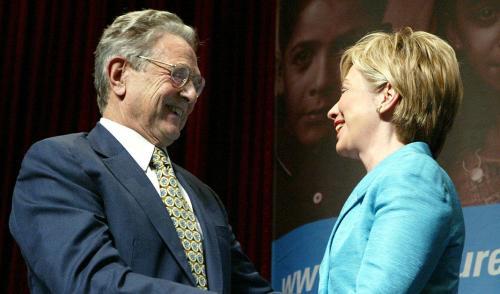by WorldTribune Staff, August 5, 2019
During the 2016 presidential campaign, U.S. officials pressured the prosecutor general of Ukraine to drop charges against a Ukrainian activist group tied to leftist billionaire George Soros that was co-funded by the Obama administration, a report said.
The group known as Anticorruption Action Center (AntAC) “was part of a larger probe by Ukraine’s Prosecutor General’s Office into whether $4.4 million in U.S. funds to fight corruption inside the former Soviet republic had been improperly diverted,” John Solomon wrote for The Hill.

“The prosecutors soon would learn the resistance they faced was blowing directly from the U.S. Embassy in Kiev, where the Obama administration took the rare step of trying to press the Ukrainian government to back off its investigation of both the U.S. aid and the group.”
AntAC was not only co-funded by the Obama administration and Soros, but “was collaborating with the FBI agents investigating then-Trump campaign manager Paul Manafort’s business activities with pro-Russian figures in Ukraine,” the report said.
AntAC received 59 percent (or $1 million) of its nearly $1.7 million budget since 2012 from U.S. budgets tied to the State and Justice departments, and nearly $290,000 from Soros’s International Renaissance Foundation, according to the group’s donor disclosure records.
“The implied message to Ukraine’s prosecutors was clear: Don’t target AntAC in the middle of an America presidential election in which Soros was backing Hillary Clinton to succeed another Soros favorite, Barack Obama,” Solomon wrote, citing Ukrainian officials.
“We ran right into a buzzsaw and we got bloodied,” a senior Ukrainian official told Solomon.
Then-U.S. embassy Charge d’ Affaires George Kent wrote the Ukraine prosecutor’s office in April 2016 in a letter that also argued that U.S. officials had no concerns about how the U.S. aid had been spent.
“The investigation into the Anti-Corruption Action Center (sic), based on the assistance they have received from us, is similarly misplaced,” Kent wrote.
At the time, the nation’s prosecutor general had just been fired, under pressure from the United States, and a permanent replacement had not been named.
A few months later, Solomon noted, Yuri Lutsenko was named prosecutor general and invited to meet new U.S. Ambassador to Ukraine Marie Yovanovitch.
Lutsenko told Solomon he was stunned when the ambassador “gave me a list of people whom we should not prosecute.” The list included a founder of the AntAC group and two members of parliament who vocally supported the group’s anti-corruption reform agenda, a source directly familiar with the meeting told Solomon.
Lutsenko suggested the embassy applied pressure because it did not want Americans to see who was being funded with its tax dollars.
“At the time, Ms. Ambassador thought our interviews of the Ukrainian citizens, of the Ukrainian civil servants who were frequent visitors in the U.S. Embassy, could cast a shadow on that anti-corruption policy,” Lutsenko said.
Kent’s letter, Solomon noted, “unequivocally shows the embassy did press Ukrainian prosecutors to back off what normally would be considered an internal law enforcement matter inside a sovereign country. And more than a half-dozen U.S. and Ukrainian sources confirmed to me the AntAC case wasn’t the only one in which American officials exerted pressure on Ukrainian investigators in 2016.”
When Solomon asked the U.S. State Department to explain the letter and inclusion of the Soros-connected names during the meeting, it responded: “As a general rule, we don’t read out private diplomatic meetings. Ambassador Yovanovitch represents the President of the United States in Ukraine, and America stands behind her and her statements.”
A U.S. official told Solomon that the Obama administration’s intervention in the AntAC case was unusual. “We’re not normally in the business of telling a country’s police force who they can and can’t pursue, unless it involves an American citizen we think is wrongly accused,” the official said.
In the end, no action was taken against AntAC and it remains a force in Ukraine politics.
Intelligence Brief __________ Replace The Media
